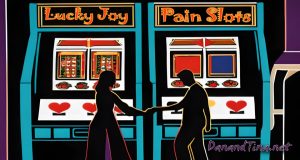
Narcissistic Abuse: Trauma Bond is like Gambling Addiction
| Amid a sea of losses, a gambling addict is always chasing the high of that next win and in victims of narcissistic abuse, a trauma bond is like gambling addiction |
In the complex realm of human psychology, parallels between seemingly disparate phenomena often emerge, shedding light on the profound intricacies of our behaviors and experiences. One such striking similarity lies between the trauma bond formed in narcissistic abuse victims and the addiction to gambling fueled by intermittent reinforcement. While on the surface these may appear unrelated, a closer examination reveals profound commonalities in their underlying mechanisms and their impact on individuals ensnared within them.
At the heart of both phenomena lies intermittent reinforcement — a psychological phenomenon where rewards or punishments are not dispensed consistently but rather sporadically. In narcissistic abuse dynamics, intermittent reinforcement manifests in the intermittent cycles of affection, validation, cruelty, abuse and manipulation perpetrated by the narcissist. For instance, the abuser may alternate between showering the victim with love and affection, only to swiftly withdraw or act in a way that inflicts emotional or psychological harm, creating a bewildering cycle of highs and lows.
| If you find this blog helpful, check out the reviews on the book! The Adventures of Dan and Tina - Enduring and Recovering from Narcissistic Abuse |
"Powerful. Truthful. Enlightening!" As an Amazon associate, I earn from qualifying purchases. |
Similarly, in gambling addiction, intermittent reinforcement occurs through the unpredictable nature of winning and losing. Slot machines, for instance, are designed to provide occasional wins amidst numerous losses, keeping the gambler hooked in anticipation of the next big win. This unpredictability hijacks the brain’s reward system, inducing a dopamine rush with each victory, regardless of its size, reinforcing the addictive behavior.
The psychological ramifications of intermittent reinforcement are profound and enduring. In both scenarios, victims or addicts become ensnared in a cycle of anticipation and disappointment, perpetually seeking validation or reward from their respective sources. This perpetuates a sense of dependence and vulnerability, as individuals become increasingly reliant on external validation or the thrill of gambling to validate their worth or alleviate emotional distress.
 Moreover, intermittent reinforcement cultivates a sense of uncertainty and cognitive dissonance. Victims of narcissistic abuse may find themselves oscillating between moments of adoration and despair, struggling to reconcile the loving facade of the abuser with their hurtful actions. Similarly, gamblers may grapple with the conflicting emotions of elation and despair, as each win is followed by the looming threat of loss, perpetuating a perpetual state of anxiety and anticipation.
Moreover, intermittent reinforcement cultivates a sense of uncertainty and cognitive dissonance. Victims of narcissistic abuse may find themselves oscillating between moments of adoration and despair, struggling to reconcile the loving facade of the abuser with their hurtful actions. Similarly, gamblers may grapple with the conflicting emotions of elation and despair, as each win is followed by the looming threat of loss, perpetuating a perpetual state of anxiety and anticipation.
Furthermore, both trauma bonds and gambling addiction foster a sense of isolation and shame. Victims of narcissistic abuse often endure their suffering in silence, trapped by feelings of shame and inadequacy, fearing judgment or disbelief from others. Likewise, individuals grappling with gambling addiction may conceal their struggles, haunted by societal stigma and internalized guilt, exacerbating their sense of isolation and despair.
The parallels between narcissistic abuse trauma bonds and gambling addiction underscore the profound impact of intermittent reinforcement on human behavior and cognition. Both phenomena exploit vulnerabilities within the human psyche, fostering dependency and perpetuating cycles of dysfunction and despair. Recognizing these parallels not only enhances our understanding of the complexities of human behavior but also underscores the importance of empathy and support for those ensnared within these destructive cycles. By shedding light on these shared mechanisms, we can cultivate greater compassion and awareness, offering hope and healing to those navigating the treacherous terrain of trauma and addiction.
Read Next: The Shared Fantasy at the Heart of Narcissistic Abuse
Click Here to Help Support DanandTina.net
Don't forget to bookmark this site and subscribe to be informed when updates are posted.
What are your thoughts on this article? Please leave feedback or start a discussion in the comments section.
If you link to an article here, let me know so I can add a link back!
Permission is granted to repost any article on DanandTina.net in whole, or in part, provided that a link back to the original post on DanandTina.net is included in the reposting.

